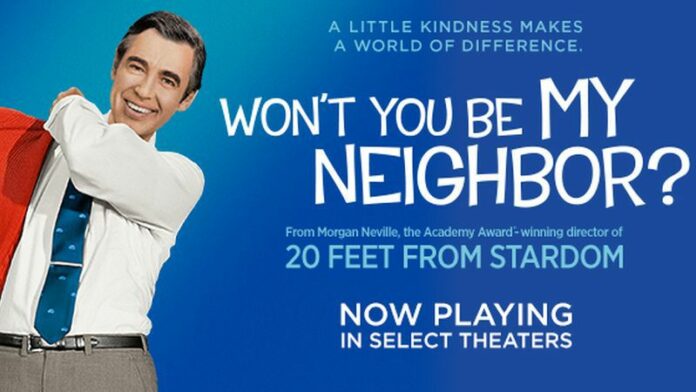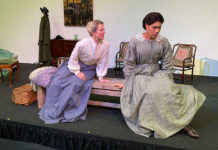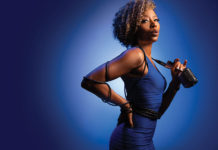I can’t imagine what Fred Rogers would think of our world today. The sweater and comfortable shoe-wearing children’s TV icon used his avuncular, calming voice and persona to share values which he thought of as Christian, but are much more universal—kindness, empathy, tolerance, dignity, willingness to accept other ideas, insatiable curiosity and quest for knowledge, tackling difficult issues head-on, and, most of all, being an all around nice person. To misquote the old Alka-Seltzer commercial, “Oh, what a relief he was.”
Morgan Neville, the documentary filmmaker who won an Oscar and a Grammy for his film about backup singers, 20 Feet From Stardom, masterfully weaves archival footage, home movies, talk show interviews, and face-time with those who knew and worked with Rogers during the 33-year run of Mr. Rogers Neighborhood on PBS. What we learn is a bit of a surprise. As a kid, Fred was frequently quarantined in his bedroom with scarlet fever and other childhood diseases. This forced him to use his imagination to create a world safe from the bullies the pudgy boy encountered outdoors. He used hand puppets and toy vehicles on his bedcover landscapes, read voraciously, and also developed a fondness for certain number combinations. One of these, 143, was the obsessive “perfect weight” he maintained for over 40 years as well as the secret “I Love You” code he shared with his wife, Joanne.
In the early 50’s, Fred produced the Sylvania Award winner, The Children’s Corner, a live, hour-long show hosted by Josie Carey for WQED Pittsburgh. Fred created the characters and supplied the voices for Daniel Tiger, X the Owl, King Friday XIII, Henrietta Pussycat, and Lady Elaine Fairchild. At the same time, Fred studied at the Pittsburgh Graduate School of Child Development and the Pittsburgh Theological Seminary and was ordained as a Presbyterian minister charged to use television to minister to children and families. He went on to earn every television, communication and early childhood education award for which he was eligible, and was inducted into the Television Hall Of Fame in 1999.
We learn from his widow, Joanne, and his children John and James that all the recurring characters who appear in the neighborhood are extensions of Fred’s personality. “He was most like Daniel Tiger,” Joanne explains, “but he could become King Friday XIII.” His son shares how his father would often speak in the voice of the imperious Lady Elaine Fairchild—a character based on Fred’s own sister, Elaine.
The human characters grew from Fred’s imagination and friendships with real people. Tellingly, the Speedy Delivery Man (played by David Newell), was named Mr. McFeely (Fred’s middle name). It turns out that like Fred himself, Handyman Negri (Jazz guitarist Fred Negri) isn’t very handy with tools and Chef Brocket (musical producer Don Brockett) can’t cook worth a darn. But it’s Francois Clemmons, the singer/actor who played Fred’s friend Officer Clemmons who gets the most screen time. It turns out that in addition to being one of the first African-Americans with a recurring role in children’s television (including the famous shared foot bath in 1969), he was the first gay African-American as well.
Perhaps the most astounding aspect of Mr. Rogers’ life was his deeply felt advocacy for the acknowledgment that every single child needs love and understanding, and the time and space to expand their potential. Fred constantly demonstrated how to do this—with his connected silences. In his conversations with children (and adults) he carefully observed their facial expressions and body language and listened intently to whatever question they were asking before providing an answer in a simple, supportive, and loving manner.
“This is especially important in times of crisis and upheaval, Fred said. “Children are very sensitive to how their parents feel. As a boy, whenever things were scary, my mother would say to me. ‘Look for the helpers. There are always people who are trying to help.”
Comments? E-mail gi*********@co*****.net
59.6
F
Healdsburg
April 18, 2025








